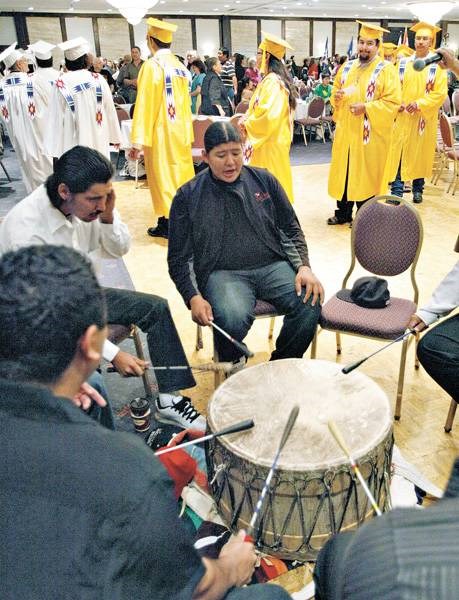Eric Shirt moves fast when it comes to fighting drugs and alcohol.
Some 35 years ago, the then-25-year-old Saddle Lake resident approached Richard Anthony, the chair of the former Alberta Alcohol and Drug Abuse Commission with a big idea: an alcohol treatment centre for aboriginals in Alberta. "He said, OK, if you guys say you can do it, let's see you do it," Shirt recalls.
A few weeks later, Shirt and Anthony were standing outside a house in downtown Edmonton. They had just agreed to turn it into Poundmaker's Lodge, the first aboriginal addictions centre in Canada.
Shirt saw a flush-faced, hung-over man on the other side of the street. "Hey," Shirt recalls saying, "come over here. My name's Eric. This is an Indian treatment centre, want to come in?"
The man looked at him for a while, paused, and said, "Okay."
Shirt laughs as he recalls Anthony's look of disbelief. "The same day we had the building, we had our first intake!"
Shirt, the founder of Poundmaker's Lodge and the Nechi Institute, was one of some 700 guests who gathered at the Delta Edmonton South Hotel last Saturday to celebrate the 35th anniversary of the Nechi Institute. The institute is one of Canada's foremost training centres for aboriginal addictions counsellors.
Nechi has trained thousands of counsellors and achieved international acclaim, Shirt says, but there's still much more work for it to do. "The problem is huge, and I'm surprised there isn't a Nechi in every province."
Start of something big
Shirt says he was one of the few sober people in his community in the 1970s. "Alcoholism was rampant in Indian country," he says, and aboriginals weren't going to provincial treatment centres — their treatment in residential schools meant they didn't trust the government.
Shirt, who was training addictions councillors at the University of California, Santa Cruz, came home and set up Poundmaker's Lodge in 1973. Poundmaker's then helped communities write proposals to create their own addictions programs. "All of a sudden we had all these people who needed councillors," he says, giving him the excuse to create Nechi.
The institute set up in a conference room in the Mayfield Hotel, he recalls. "We had to bring in a telephone wire over the alley." They also rented, but didn't use, rooms at the University of Alberta just so they'd have an academic-looking address. The institute later moved to a home in Enoch and a church basement before arriving in its current home near St. Albert in 1984.
Provincial treatment centres at the time were sending the wrong message to addicted aboriginals, Shirt says: you can't do it and we have to help you. "People have to be allowed the dignity of solving their own problems," he says. Nechi teaches its councillors to use traditions, personal experiences and peer support to help addicts beat their own addictions.
The institute helped create a wave of sober aboriginals who went on to post-secondary and leadership positions, says Maggie Hodgson, CEO of Nechi from 1982 to 1996. Councillors helped communities such as Alkali Lake, B.C. go from almost 100-per-cent alcoholism to 95 per cent sobriety.
The institute broke new ground in its research into traditional medicines and addictions, Hodgson says, and created the Healing Our Spirit Worldwide conference in 1990 — the world's first international indigenous addictions research network. It also pushed the House of Commons to declare National Addictions Awareness Week in 1990.
"Nechi is like the aboriginal Harvard," Hodgson says, with many of its grads going on to become successful community leaders. Some of this year's 113 grads are grandchildren of the institute's first students in the 1970s. "The focus of the program is to encourage people to excel and help make their community stronger, and that hasn't changed."




